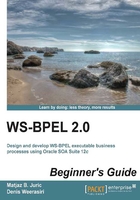
Preface
WS-BPEL 2.0 (Business Process Execution Language for Web Services, also BPEL or BPEL4WS) has become the industry standard for orchestration of services, implementation of business processes, and development of composite applications. BPEL provides a rich vocabulary for expressing the behavior of business processes and composites. Although it looks quite simple at first sight, BPEL provides a rich set of operations (called activities) to model the process flows of composite applications, such as asynchronous and parallel invocation of services, correlation, event, fault, compensation and termination handlers, scopes, source and destination links, and so on.
BPEL is an OASIS specification. It is not owned by a specific vendor or company. This means that using BPEL leads to the development of portable, vendor-agnostic solutions. BPEL is also supported by major BPM/SOA-development platforms, including most important commercial platforms such as Oracle SOA Suite and Oracle JDeveloper, IBM WebSphereBPM, and so on, and open source tools and servers, such as JBoss, Eclipse, and so on.
Although BPEL is widely used, studies have shown that most software architects and developers do not have an in-depth familiarity with the BPEL language. The majority of them are familiar only with the basics, which is also reflected in BPEL code that in most cases includes only the most straightforward activities. An in-depth familiarity with BPEL is essential to unleash its full potential. Therefore, it makes sense to publish a book that covers BPEL functionality for beginners, showing step-by-step how to use BPEL from the most straightforward to the more complex scenarios.
This book will guide software architects and developers through the BPEL language and teach them the various activities, use-cases, and scenarios that can be developed in BPEL. The book will be a beginner's guide, starting with the basics and advancing through different increasingly complex scenarios. The book will be tool-independent, but will show how to use BPEL with most popular tools, such as JDeveloper, SOA Suite (from Oracle), and so on.